Joe Nosek and Oscar Wilson – Interview
by Matteo Bossi
A few weeks before the release of their new album “Oscar’s Motel”, the third one for Alligator, we get the chance to talk with the Cash Box Kings co-leaders Joe Nosek and Oscar Wilson. Now including musicians from different generations and life paths as Kenny Smith, Billy Flynn, John Lauler on bass and Lee Kanehira on keyboards, through the years and some line-up changes, the band has been loyal to its love for traditional Chicago blues, from the fifties and early sixties. But they’re not just good interpreters or revivalists of the past, the quality of the songwriting is what sets them apart from many of today’s bands. And it shows on the new album as well through plenty of original songs, like “Trying So Hard” penned by another band member, veteran guitarist Billy Flynn or the hilarious duet with Deitra Farr, “I Can’t Stand You”.
Joe, when you first put together the band, more than twenty years ago, would you have imagined this kind of musical journey?
Nosek: Well, no I would not have believed we’d still be together, play around the world, be on Blind Pig Records and then Alligator Records. I’d never believe that, as a kid, I’d probably die of a heart attack. So it’s been a pretty incredible journey, we are proud of what we’ve accomplished and look forward to the future and to bring the band to new heights.
The first album featuring Oscar Wilson as a singer was the Live At The Cuda Cafè, which documented a 2007 gig in Wisconsin. Did he join the band just a few months earlier?
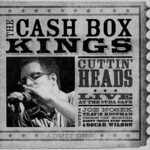 Nosek: Yes Oscar had been with us maybe six months before that. Our original guitar player and co-band leader Travis Koopman had a blues jam…Oscar had moved to Wisconsin, which is a little north of Chicago. And he happened to go to that blues jam and Travis just started talking to him and he came up and sing and did very well. He came back the next week and Travis said “hey Oscar what do you want to do? Is there anything you want to do musically?” And he said “I want to play Buddy Guy’s down in Chicago”. And Travis said “well we’re playing there in two weeks, you can come and sing with us”. So Travis talked to me and I said – Are you sure this guy is really good? – You know I’m a little nervous, I never met him before. I met him that night and he sings three songs and got three standing ovations, the crowd goes wild. I said “Ok we’ll work this out.” And that’s how it all started.
Nosek: Yes Oscar had been with us maybe six months before that. Our original guitar player and co-band leader Travis Koopman had a blues jam…Oscar had moved to Wisconsin, which is a little north of Chicago. And he happened to go to that blues jam and Travis just started talking to him and he came up and sing and did very well. He came back the next week and Travis said “hey Oscar what do you want to do? Is there anything you want to do musically?” And he said “I want to play Buddy Guy’s down in Chicago”. And Travis said “well we’re playing there in two weeks, you can come and sing with us”. So Travis talked to me and I said – Are you sure this guy is really good? – You know I’m a little nervous, I never met him before. I met him that night and he sings three songs and got three standing ovations, the crowd goes wild. I said “Ok we’ll work this out.” And that’s how it all started.
Wilson: It was an accident…I call it divine intervention. Because of all the people at the jam that day, this guy would come to me out of nowhere, he came to my table and introduced himself, this guy Travis. I had done some standing in with Johnny B. Moore or Melvin Taylor band, actually, my ex-brother-in-law was the bass player for them. And he would come up and ask me to sing a song, a Johnny Taylor song maybe, just for fun, I never thought that I would actually be into this like I am. It’s just one of those things, being in the right place at the right time, I guess.
You had moved out of Chicago by then?
Wilson: I never really hang around the Chicago scene…Everything I know about blues I learned from my household. My father was a bluesman who passed away two months before I was born, H.S. Wilson. Blues was always played in my house, my mother would play Lightnin’ Hopkins, he was my favorite blues guy. My mom said my father played in that style and he was like ten years older than Lightnin’ so he might have taken his style from him, but who knows…but he was the closest thing she had to what he did, and while she would be working around the house she’d put this music on. That’s how I became so close to music when I was three years old. Then she would have fish fries and things and some of the guys like Honeyboy Edwards, Elmore James, Junior Wells, Big Smokey Smothers…all of them would come over to our house. And that was before everything was electrified, they would be sitting around just playing their box guitars and harmonicas and I was a little boy and I would be standing there watching them. It drew me for as long as I can remember. I was born in 1953 and I can remember as far back as three years old and I’d be walking around singing blues songs! As a little boy, the first time I saw Honeyboy Edwards was at a house party on 43rd street and we were going to the store to get some candy and I heard the music from across the street where the house party was and I went over there and stood in the door. And he said hey little boy do you like the blues? And I said yes sir. But can you sing the blues? Yes sir. What do you want to sing? And I said Still A Fool, Two Trains running! I always hang around blues, I learned all kinds of music, blues, gospel, doo-wop, Motown, Philly’s sound…but the blues is in my heart.
Joe, how did Oscar’s presence change the band? And how did your friendship evolve over the years?
Nosek: Oscar came to the band at a pivotal moment, because one of the founding members, Travis Koopman, was leaving the country and moving away. And we’re kind of at a crossroads, either start a new band or reshape the Cash Box Kings. It made a lot of sense because I knew that though Oscar had not played professionally until then, the blues was in his DNA, in his blood. I thought, let’s transform things and really try to make him a key part of the group. It took time, like anything, but there was no doubt he had the musical talent, the authenticity. He took on that role and I remember saying hey we should write songs. He said ah no I can’t write songs… And now he’s a natural at it, we sit down with a guitar and write songs. He learned how to become a frontman and kind of an ambassador for the group…it’s been a journey and a great one. He’s a dear friend of mine and he’s shown great kindness to my kids, his family is like family to me and likewise. I can’t imagine the band without the two of us fronting it together. Like he said maybe it was divine intervention that happened! For me to have someone like him in this group…I don’t have a direct connection to this music culturally, you know, but Oscar does, when you have Elmore James playing house parties in your house, he really has this connection and he showcases that in the band.
You also have another guy like Kenny Smith, who is about your age Joe, and born and raised in a blues family.
Nosek: I actually met Kenny when I had an early blues band and one night we opened for Billy Boy Arnold and Kenny was playing drums with him. He and I just started talking at the bar and I told him, I want to start a real traditional Chicago blues band with some younger players and he said, “hey man, let me know because that’s my favorite music in the world, Chess records, Muddy Waters, Howlin’Wolf…but most guys I play with today are my dad and his friends. I’d love to play with cats my age.” That’s how it started, with four or five guys our age. Kenny and I are the same age. Then when we met up with Oscar he brought a little more legitimacy to the group.
Wilson: Old man!
Oscar, you sing about your own life experiences in a song like “Down On The Southside” in the new album.
Wilson: Yes, it’s all true! Those characters were there. We have to leave out some stuff, the song was even longer, but all of those things were real. Back then there were taverns all over the neighborhood, on every other corner and there was always something going on. You could move from this spot to this other spot and you did not need a car, you know what I mean? You didn’t have to drive, there was no DUI back then, you could walk to this joint and they were all partying,…Now there’s no joint over there no more, things started disappearing as I grew up. Older people who owned the places and their kids didn’t keep it going…and so on. But there were some characters, man, I sing something about my cousin, my brother, my sisters and different people of the neighborhood who would be in the joints shooting dice…Everybody knew everybody, it was like a village, there were no strangers, and everything that you wanted to do was right there at the time. My world was in a mile radius. Work was good, there were steel mills, stockyards…I’ve never thought I’d be going overseas or even singing in a blues group. But then I had to wait till I was 53!
Joe came to the blues culture from a different path
Wilson: Yes from suburbia!
Like you sing in one of your songs.
Wilson: Joe you ain’t from Chicago…yes, all the stuff we write is actually true stuff. It’s about something that happened, Gotta Move Out To The Suburbs is like my neighborhood now, it is going through gentrification, and they’re moving people out because they can’t afford to live there. Now you got Starbucks on every corner!
Joe, you grew up in Wisconsin and then moved to Chicago?
Nosek: I moved to the Chicago area, during my teenage years and then I came back up to Madison, Wisconsin to attend the University. It’s only about two hours from Chicago so I maintained a connection all these years. I was lucky enough, in my teens I started sneaking in the blues bars and I saw Jimmy Rogers, James Cotton, Otis Rush, Buddy Guy, Junior Wells, Lockwood, The Myers brothers…and the list goes on and on. The impact that they had on me was life-altering, and very profound. When I saw that music being played live I thought I have to figure out how these guys are making that music and someday maybe I could play in a club like this. But it seemed like a dream.
While you were at the university I read one of your teachers was Jim Schwall, is that right?
Nosek: Yes. I knew the Siegel Schwall band, I really liked them. In my first year in college, I was a music major for a while, there was a musical composition course, and we studied XVII century baroque music, Bach, choral music…I looked in front of the classroom and that was Jim Schwall! I went to one of the guys next to me and said I think that’s Jim Schwall and he goes who the hell is Jim Schwall? None of the kids my age knew him. Then I talked to him…I had bad grades, Jim would have red ink all over my compositions, and when I went to his office he started to say things like in the first measure you have a diminished fifth but you should have a diminished eight…and I would ask him how Howlin’ Wolf was or did you ever play with Muddy Waters? And he’d start talking about them, Pepper’s and Sylvio’s and the Chicago blues scene back in the sixties. But then again he’d say we got to go back to your composition here, you got all these problems. I never became a composer, I stopped studying classical music, but I got to know Jim outside of the classroom and even played with him a bit as I grew older and we’d laugh about that. Jim was a very accomplished classical composer and Corky got the Chamber Blues project, with a strings quartet…they’re both very cerebral and have a wide musical taste.
How did you guys approach the writing for the new album?
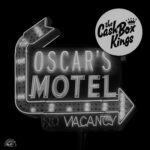 Wilson: It was the pandemic, being homebound made me think about a lot of things. There used to be a hotel in the neighborhood, it was a small, transient hotel or something like that. It had a bar, room upstairs, a department store on the main floor, it was always full of people having a party…I just inserted my name in the motel, but the things that were going on, somebody in the back cooking…it was just things I remembered then we collaborated to bring
Wilson: It was the pandemic, being homebound made me think about a lot of things. There used to be a hotel in the neighborhood, it was a small, transient hotel or something like that. It had a bar, room upstairs, a department store on the main floor, it was always full of people having a party…I just inserted my name in the motel, but the things that were going on, somebody in the back cooking…it was just things I remembered then we collaborated to bring
Nosek: We knew there are serious issues to talk about, but we also knew that having gone through the pandemic and the Trump years here in America, people are just tired, exhausted, burned out. So we made a conscious decision not to focus a lot of energy on social or political issues. We felt people needed a kind of escape, we wanted to bring some joy and happiness, music that would tell stories that celebrated this culture and make people leave their worries and troubles behind. And Oscar’s Motel was the perfect song to start the album with, it’s an invitation to relax and have fun.
Wilson: Even some of the political songs we did in the past, were true things that happened. Like Bluesman Next Door or Jon Burge Blues about a dirty cop…
How about the song you do with Deitra Farr, “I Can’t Stand You”? Is it fun to sing with a woman, as you did with Shemekia Copeland in the previous record?
Wilson: Well that’s another thing that came about during the pandemic with me and Deitra. It developed into a soap opera and people wanted to hear us go at it! Do we really don’t like each other? I can’t stand you, I can’t stand you either…So me, Deitra and Joe wrote the song.
Nosek: We could not stop laughing, it was so much fun! Wish I could record them, it was so easy to write that and we did it on Zoom during the pandemic.
How did the collaboration with John Nemeth start?
Nosek: I think Oscar and John went drinkin’ one night in Memphis and they say, man, we got to do a song together. And I got an idea, I was working on a song, I Want What Chaz Has, that I thought would be perfect for John and Oscar to sing together. And it’s about a friend of ours, Chaz, a great guy. John was great and he recorded his part the day before he flew to Houston to have surgery. He thought it could be the last song he would ever sing, but he didn’t know. He recorded his album with Kid Andersen and Elvin and then came back to Memphis, cut this song and then went to Texas. He’s a great singer and a great cat John. We’re glad he’s doing good now, it’s a miracle.
Will you tour a lot to support the new album?
Nosek: We have some US dates in the midwest and Canada. We’re hoping to branch out and play in Europe more next year, we never played Italy.
Wilson: I’m a big Soprano fan!
Nosek: Oscar wants to try the Italian food he sees in the mafia movies here.
Wilson: Well actually in the neighborhood I grew up it was diverse, different cultures, you had Polish, Irish, Jewish, Black, even Italian…as kids we go from house to house. I remember the Italian lady cooking and making the sauce, the meatballs…and we would eat. And it’s like soul food, the best you can get is to go to somebody’s mama house and get it like it’s supposed to be done. My mama cooked from scratch, not from boxes, now everything’s fast and from a box.
It’s a bit like your way of playing the blues like it used to be played back then.
Nosek: Exactly!
After self-producing your first records, you’ve been with Blue Bella, Blind Pig and this is your third Alligator album? What does that mean to you?
Wilson: It’s an honor to be on Alligator, that’s the n.1 label and it’s awesome, it gives you a wider audience, and more people get to know who you are.
Nosek: Some of my favorite records are on Alligator, Hound Dog Taylor, Big Walter Horton…I would not believe as a kid that one day I’d be with them. When Blind Pig was sold to Sony, Jerry (Del Giudice) said he wanted to help us find a new home, because he believed in our music. He reached out to Bruce -he was always my competitor, he said, – be we have a friendly rivalry-. He introduced us and Bruce and I talked for a long time before we made an agreement. I was really honest with him, I didn’t think wanted to sign us because we don’t tour all the time. I have three little kids and a day job, so I can’t tour 300 days a year. Kenny’s got kids too…but Bruce believes so much in the music we’re making, especially in the fact that it is traditional but with our own voice and bringing it up with the modern day with the issues we’re tackling. Bruce is one of the biggest old-school Chicago blues you’ll ever meet, he’s like a historian. But he is also very socially and politically active. One of the songs that attracted him was Built That Wall, which I wrote as an anti-Trump song. Some people said it’s not good to have politics and he said I don’t care, I respect this group and the songs they’re writing. Bruce and the label have been very helpful and supportive of us. As Oscar said, we’re lucky to be with them.
Do you feel a responsibility to, in your way, carry on the tradition?
Wilson: We have to keep these blues alive, to me, it’s very important. I do sometimes with Billy Branch the Blues in the Schools, so hopefully one or two of those kids will feel it. It’s just like when I’m singing. I don’t expect the whole house to feel me, but if one or two people feel what’s coming out of my heart and my mouth…One time I was at a restaurant show, on a Sunday afternoon. A thought just crossed my mind, and I said let’s play an A minor blues, singing that my old lady quit me the other day, would she listen to me and take me back if I called her on the telephone? And there was a guy over there who was falling apart and a lady came to me and handed me a hundred dollar bill, from that guy, his girlfriend just quit him today. So the song touched him. You see, they might not have come for the blues but they got the blues that day. That’s what I try to project into my crowd. But I can’t deliver a song today the same way I did yesterday, because today I feel this way. The same song that makes you happy can make you sad. In my family it was like that with Come On In This House, I mean, on Friday my stepfather worked construction, they were getting ready to go out and this song was playing, But other times there might be a fight. Same song. I and my sister and brother didn’t understand then, but I do now. When I listen to that song it takes me back to when I was six, good memories and bad memories. But this is the blues.


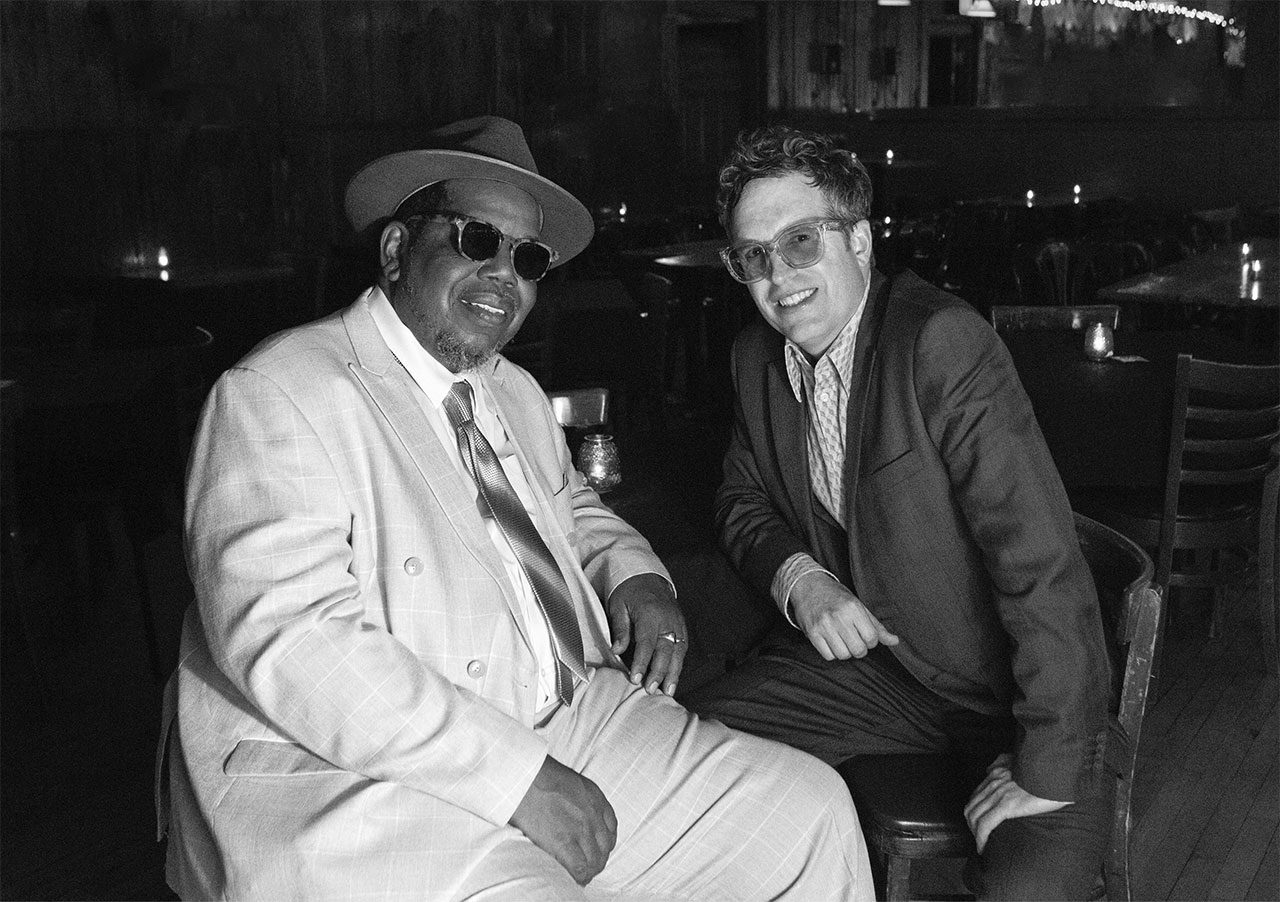
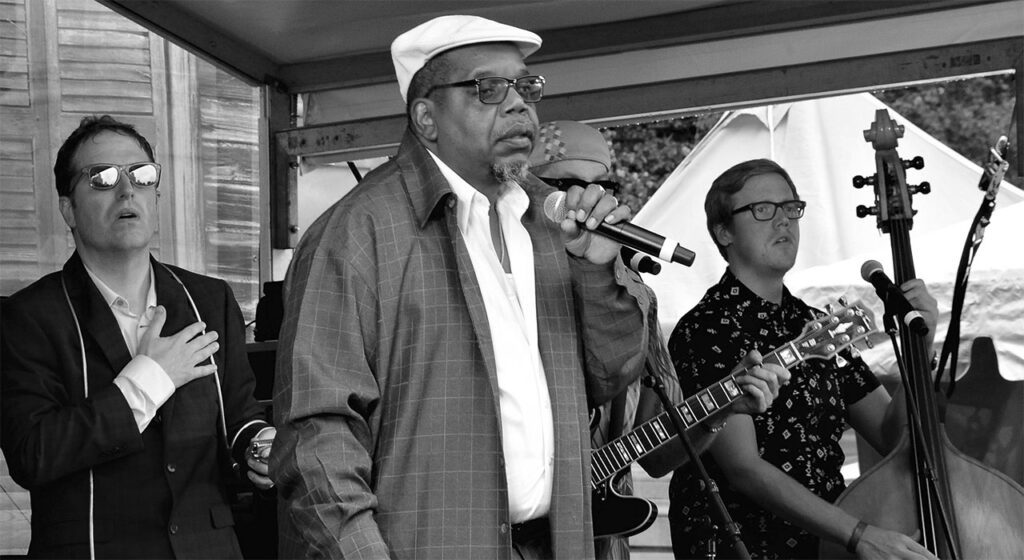
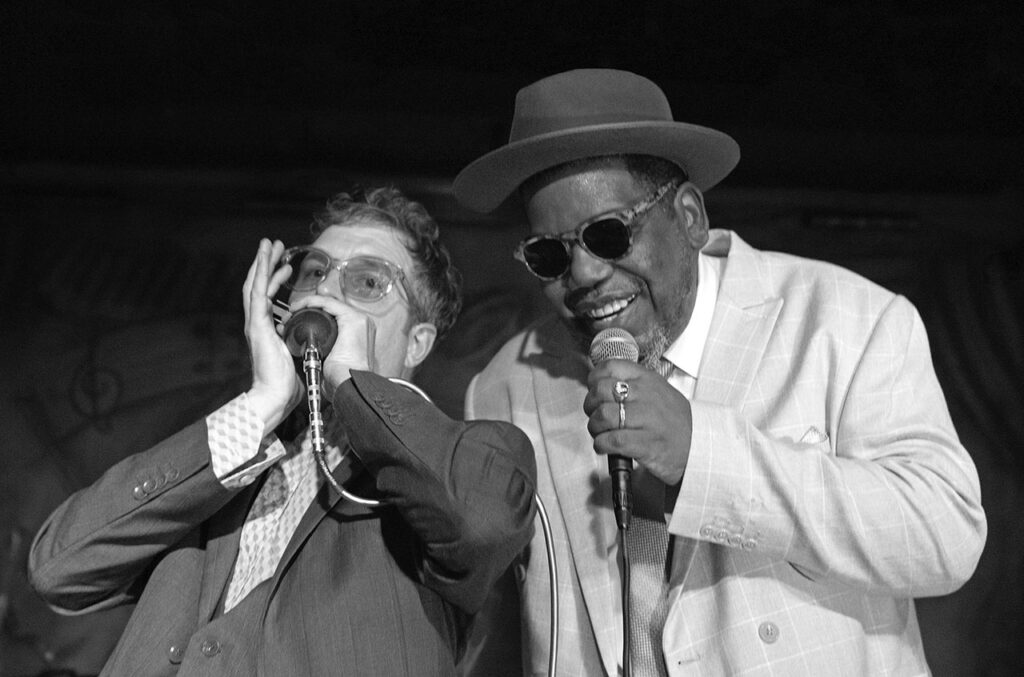








Comments are closed